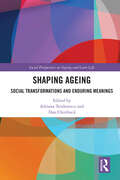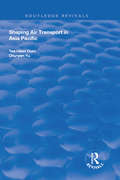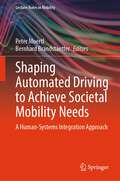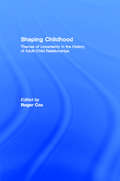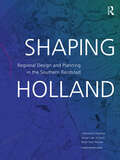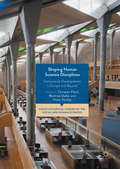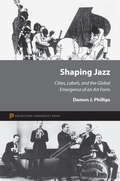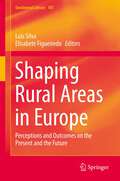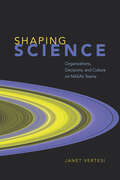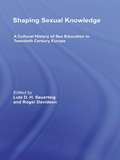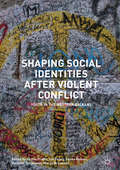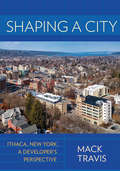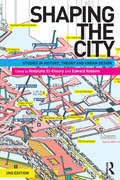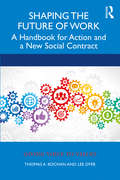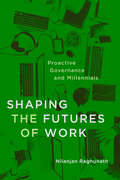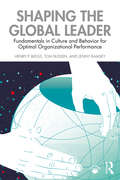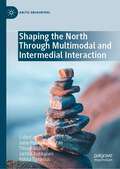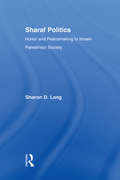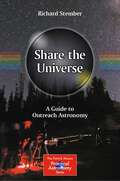- Table View
- List View
Shaping Ageing: Social Transformations and Enduring Meanings (Social Perspectives on Ageing and Later Life)
by Adriana Teodorescu Dan ChiribucăThis volume examines the manifold, often contradictory, aspects of ageing, considering the ways in which contemporary social transformations affect the experience, conception, interpretation, and representation of ageing. Thematically arranged, it brings together the latest scholarly work from around the world to consider theories and narratives of ageing and the effects of space and place on identity and the experience of old age. Combining micro and macro perspectives, as well as theoretical and applied research, this interdisciplinary volume offers cross-cultural and comparative studies that resist overgeneralization and reductivism in an effort to shed fresh light on our experience, understanding, and response to ageing in the modern world. As such, it will appeal to scholars across the social sciences, particularly sociology, gerontology, demography, social policy, and cultural studies, with interests in ageing and later life.
Shaping Air Transport in Asia Pacific
by Tae Hoon Oum Chunyan YuThis title was first published in 2000: A comprehensive assessment of the markets and outlook for the air transport industry in the Asia-Pacific region. The book examines options for improvement of the regulatory system and industry structure, drawing on experience within and outside of the region. It includes the short- and long-term effects of the current economic crisis on Asian airlines and air transport markets and differs from other works due to its description and analysis of all major aspects of the Asian air transport industry and airlines.
Shaping Automated Driving to Achieve Societal Mobility Needs: A Human-Systems Integration Approach (Lecture Notes in Mobility)
by Peter Moertl Bernhard BrandstaetterThis edited book describes novel human-systems integration approaches to improve acceptance, safety, and comfort of automated vehicles. Each chapter analyses different aspects in the development of automated driving systems such as: assessing needs and opportunities of specific user populations i.e. elderly drivers and truck drivers; creating fluid human-systems interactions in the vehicle to answer specific driver needs; developing an automated driving tutoring application; and identifying benefits of including road infrastructure sensors to support automated driving predictability. A detailed description of the assessment of the above-described solutions in real-world situations is also included. Written by both researchers and professionals, this book offers timely and practice-oriented information concerning the development of automated driving systems that better adapt to the users’ needs.
Shaping Childhood: Themes of Uncertainty in the History of Adult-Child Relationships
by Roger CoxWhat part has religion played in the history of child-rearing? How do we persuade children to behave rationally and how should we exercise adult authority? What use do we make of their innocence and how do we cope with their sexuality? Has history left us with ideas about the child which make no sense in the prevailing conditions of the late twentieth century? In Shaping Childhood these questions are explored through themes from the history of childhood. The myth of the repressive Puritan parent is explored by looking at Puritan ideals of child-rearing. Treating the child as if it were rational seemed to Locke the best way to approach child-rearing, but Rousseau was sceptical of adult manipulation and Romanticism could be subversive of both religion and reason as sources of discipline in child-rearing. The Victorians inherited many of the contradictions these approaches gave rise to, and they added a complication of their own through an aesthetic response to childhood's beauty. Currently, with instability in household formation and with the child exposed to ever more sophisticated means of communication, parents, teachers and others struggle to make sense of this ambiguous historical legacy. Shaping Childhood examines the ways in which broad cultural forces such as religion, literature and mass consumption influence contemporary parenting and locates child professionals, within the context of these forces.
Shaping Gender Policy in Turkey: Grassroots Women Activists, the European Union, and the Turkish State (SUNY Press Open Access)
by Gül Aldıkaçtı MarshallShaping Gender Policy in Turkey uncovers how, why, and to what extent Turkish women, in addition to the Turkish state and the European Union, have been involved in gender policy changes in Turkey. Through analysis of the role of multiple actors at the subnational, national, and supranational levels, Gül Aldıkaçtı Marshall provides a detailed account of policy diffusion and feminist involvement in policymaking. Contextualizing the meaning of gender equality and multiple approaches to women's rights, she highlights a pivotal but neglected dimension of scholarship on Turkey's candidacy for European Union membership. This book represents one of the few works providing a multilevel analysis of gender policy in predominantly Muslim countries, and highlights Turkey's role at a time of swift structural changes to several political regimes in the Middle East.This book is freely available in an open access edition thanks to Knowledge Unlatched—an initiative that provides libraries and institutions with a centralized platform to support OA collections and from leading publishing houses and OA initiatives. Learn more at the Knowledge Unlatched website at: https://www.knowledgeunlatched.org/, and access the book online at the SUNY Open Access Repository at http://hdl.handle.net/20.500.12648/1708.
Shaping Holland: Regional Design and Planning in the Southern Randstad
by Jeroen van Schaick Francisco Colombo Peter WitsenAll around the world, regions are facing major challenges: climate change, the transition to renewable energy, reinventing the food system, ongoing urbanisation and finding room to sustain biodiversity. These will radically transform our living and working environments. Regional design uses the power of visualisation to unite regional players around appealing spatial development visions for meeting those challenges. It offers a route to new forms of regional governance and planning that match the urgencies of our time. This book exposes the benefits and the pitfalls of regional plans and designs. Shaping Holland gives a unique insight into the emergence of contemporary regional planning and design practice in the Netherlands. This densely populated country in the delta of the Rhine and Meuse rivers is internationally renowned for its urban planning and design tradition. Drawing on first-hand accounts and a rich collection of illustrations, maps and diagrams, the book gives pointers for practitioners, academics and students of spatial planning, urban design and landscape architecture. Regional design is on the rise in all continents. It provides an answer to a world in which economic activities, activity patterns, urban growth and ecological systems are no respecters of administrative boundaries. Amid the growing number of academic analyses of regional design, this book is unique because it focuses on planning practice and first-hand knowledge. As such it is of interest to a broad international readership.
Shaping Human Science Disciplines: Institutional Developments in Europe and Beyond (Socio-Historical Studies of the Social and Human Sciences)
by Christian Fleck Matthias Duller Victor KarádyThis book presents an analysis of the institutional development of selected social science and humanities (SSH) disciplines in Argentina, France, Germany, Hungary, Italy, the Netherlands, Sweden and the United Kingdom. Where most narratives of a scholarly past are presented as a succession of ‘ideas,’ research results and theories, this collection highlights the structural shifts in the systems of higher education, as well as institutions of research and innovation (beyond the universities) within which these disciplines have developed. This institutional perspective will facilitate systematic comparisons between developments in various disciplines and countries. Across eight country studies the book reveals remarkably different dynamics of disciplinary growth between countries, as well as important interdisciplinary differences within countries. In addition, instances of institutional contractions and downturns and veritable breaks of continuity under authoritarian political regimes can be observed, which are almost totally absent from narratives of individual disciplinary histories. This important work will provide a valuable resource to scholars of disciplinary history, the history of ideas, the sociology of education and of scientific knowledge.
Shaping Jazz: Cities, Labels, and the Global Emergence of an Art Form
by Damon J. PhillipsThere are over a million jazz recordings, but only a few hundred tunes have been recorded repeatedly. Why did a minority of songs become jazz standards? Why do some songs--and not others--get rerecorded by many musicians? Shaping Jazz answers this question and more, exploring the underappreciated yet crucial roles played by initial production and markets--in particular, organizations and geography--in the development of early twentieth-century jazz.Damon Phillips considers why places like New York played more important roles as engines of diffusion than as the sources of standards. He demonstrates why and when certain geographical references in tune and group titles were considered more desirable. He also explains why a place like Berlin, which produced jazz abundantly from the 1920s to early 1930s, is now on jazz's historical sidelines. Phillips shows the key influences of firms in the recording industry, including how record companies and their executives affected what music was recorded, and why major companies would rerelease recordings under artistic pseudonyms. He indicates how a recording's appeal was related to the narrative around its creation, and how the identities of its firm and musicians influenced the tune's long-run popularity.Applying fascinating ideas about market emergence to a music's commercialization, Shaping Jazz offers a unique look at the origins of a groundbreaking art form.
Shaping Organizational Strategies: Future Perspectives, Concepts and Cases
by Gautam Raj Jain Atul TandanThis book equips students and practising managers with strategic insights into the process of managing odds and for dealing with emerging fluid situations which can affect any organization. The authors emphasize that managers should not rely on theories and models for dealing with organizational dynamics but instead need to think out of the box. Contemporary cases have been incorporated, based on real business situations in India. These are grouped into six modules: the organization and its environment; corporate governance; challenges for future managers; personal and interpersonal dynamics at work; mentoring and empowerment; and managing organizational crises.
Shaping Rural Areas in Europe
by Luís Silva Elisabete FigueiredoShaping Rural Areas in Europe. Perceptions and Outcomes on the Present and the Future sets out to investigate the effect of urban perceptions about the rural and consequent demands on rurality on the present and future configurations of rural territories in Europe in the early twenty-first century. This volume presents and discusses a broad range of case studies and theoretical and methodological approaches from different academic fields, mainly Anthropology, Sociology and Geography.
Shaping Science: Organizations, Decisions, and Culture on NASA’s Teams
by Janet VertesiIn Shaping Science, Janet Vertesi draws on a decade of immersive ethnography with NASA’s robotic spacecraft teams to create a comparative account of two great space missions of the early 2000s. Although these missions featured robotic explorers on the frontiers of the solar system bravely investigating new worlds, their commands were issued from millions of miles away by a very human team. By examining the two teams’ formal structures, decision-making techniques, and informal work practices in the day-to-day process of mission planning, Vertesi shows just how deeply entangled a team’s local organizational context is with the knowledge they produce about other worlds. Using extensive, embedded experiences on two NASA spacecraft teams, this is the first book to apply organizational studies of work to the laboratory environment in order to analyze the production of scientific knowledge itself. Engaging and deeply researched, Shaping Science demonstrates the significant influence that the social organization of a scientific team can have on the practices of that team and the results they yield.
Shaping Sexual Knowledge: A Cultural History of Sex Education in Twentieth Century Europe (Routledge Studies in the Social History of Medicine)
by Roger Davidson Lutz SauerteigThe history of sex education enables us to gain valuable insights into the cultural constructions of what different societies have defined as 'normal' sexuality and sexual health. Yet, the history of sex education has only recently attracted the full attention of historians of modern sexuality. Shaping Sexual Knowledge: A Cultural History of Sex Education in Twentieth Century Europe makes a considerable contribution not only to the cultural history of sexual enlightenment and identity in modern Europe, but also to the history of childhood and adolescence. The essays collected in this volume treat sex education in the broadest sense, incorporating all aspects of the formal and informal shaping of sexual knowledge and awareness of the young. The volume, therefore, not only addresses officially-sanctioned and regulated sex education delivered within the school system and regulated by the State and in some cases the Church, but also the content, iconography and experience of sexual enlightenment within the private sphere of the family and as portrayed through the media.
Shaping Social Identities After Violent Conflict
by Felicia Pratto Iris Žeželj Edona Maloku Vladimir Turjačanin Marija BrankovićThis book examines the identities of young adults in Bosnia-Herzegovina, Serbia, Kosovo, and Macedonia. With research drawn from a large multidisciplinary project exploring a potential for reconciliation in post-conflict societies, the authors discuss the interplay between ethnic, religious and national identities that have been the source of recent violent conflicts. They focus on people aged 18-30, representing generations that are socialized after the wars, but live in ethnically divided societies burdened with a difficult history. Another aim of the project was to compare majority and minority perspectives within each country, and to provide a unique view on how to reinterpret and build more inclusive social identities. Scholars and organizations interested in areas of social psychology, political science and sociology will find this research of great value.
Shaping Women's Work: Gender, Employment and Information Technology (Longman Sociology Series)
by Juliet WebsterA new book offering a broad overview of the debates about technologies and gender relations at work in a range of occupational areas. Innovative in its approach it deals with gender relations in terms of the ways in which they influence the design and development of technologies, and how gender relations are themselves shaped by technologies. The book will draw heavily on the theoretical perspective looking at the ways in which sexual divisions of labour and gender relations in the workplace profoundly affect the direction and pace of technological change, and tracks the development of certain technologies showing how, through their evolution, they embody these social relations.
Shaping a City: Ithaca, New York, a Developer's Perspective
by Mack TravisPicture your downtown vacant, boarded up, while the malls surrounding your city are thriving. What would you do?In 1974 the politicians, merchants, community leaders, and business and property owners, of Ithaca, New York, joined together to transform main street into a pedestrian mall. Cornell University began an Industrial Research Park to keep and attract jobs. Developers began renovating run-down housing. City Planners crafted a long-range plan utilizing State legislation permitting a Business Improvement District (BID), with taxing authority to raise up to 20 percent of the City tax rate focused on downtown redevelopment.Shaping a City is the behind-the-scenes story of one developer’s involvement, from first buying and renovating small houses, gradually expanding his thinking and projects to include a recognition of the interdependence of the entire city—jobs, infrastructure, retail, housing, industry, taxation, banking and City Planning. It is the story of how he, along with other local developers transformed a quiet, economically challenged upstate New York town into one that is recognized nationally as among the best small cities in the country.The lessons and principles of personal relationships, cooperation and collaboration, the importance of density, and the power of a Business Improvement District to catalyze change, are ones you can take home for the development and revitalization of your city.
Shaping of European Education: Interdisciplinary approaches (Studies in European Education)
by Romuald Normand Martin LawnThe range, speed and scale of Europeanizing effects in education, and their complexity, has produced a relatively new field of study. Using scholarship and research drawn from sociology, politics and education, this book examines the rise of international and transnational policy and the flow of data and people around Europe to study Europeanizing processes and situations in education. Each chapter creates a space for policy research on European education, involving a range of disciplines to develop empirical studies about European institutions, networks and processes; the interplay between policy-makers, stakeholders, experts, and researchers; and the space between the European and the national. The volume investigates the construction of European education, exploring the consideration of the role of think tanks and consultancies, international organizations, researcher mobilities, standards, indicators of higher education, and cultural metaphor. Bringing together international contributors from a variety of disciplines across Europe, the book will be of key value to academics, researchers and postgraduate students in the fields of education studies, politics and sociology.
Shaping the City: Studies in History, Theory and Urban Design
by Rodolphe El-Khoury Edward RobbinsTaking on the key issues in urban design, Shaping the City examines the critical ideas that have driven these themes and debates through a study of particular cities at important periods in their development. As well as retaining crucial discussions about cities such as Los Angeles, Atlanta, Chicago, Detroit, Philadelphia, and Brasilia at particular moments in their history that exemplified the problems and themes at hand like the mega-city, the post-colonial city and New Urbanism, in this new edition the editors have introduced new case studies critical to any study of contemporary urbanism – China, Dubai, Tijuana and the wider issues of informal cities in the Global South. The book serves as both a textbook for classes in urban design, planning and theory and is also attractive to the increasing interest in urbanism by scholars in other fields. Shaping the City provides an essential overview of the range and variety of urbanisms and urban issues that are critical to an understanding of contemporary urbanism.
Shaping the Future of Work: A Handbook for Action and a New Social Contract (Giving Voice to Values)
by Thomas A. Kochan Lee DyerThis book provides a clear roadmap for the roles workers and leaders in business, labor, education, and government must play in building a new social contract for all to prosper. It is a call to action for a collaborative effort to develop both high-quality jobs and strong, successful businesses while simultaneously overcoming the deep social and economic divisions that are all too apparent in society today. Written by two leading and trusted experts in the field of employment and work from MIT and Cornell University, this book is a practical, action-oriented guide. Readers will feel empowered to take actions needed to shape a better future of work for themselves, their employees, their co-workers, and others they may represent. It emphasizes the need to fix America's broken social contract and reimagine a new one. The most important message of this book is that we have the ability to shape the work of the future by harnessing the power of new technologies. The book is essential reading for business executives, labor leaders and workforce advocates, government policy makers, politicians, and anyone who is interested in using emerging knowledge and technologies to drive innovation, creating high-quality jobs, and shaping a more broadly shared prosperity.
Shaping the Futures of Work: Proactive Governance and Millennials
by Nilanjan RaghunathThe widespread belief that tech-savvy, educated millennials are well positioned to handle the challenges of the fourth industrial revolution is unfounded. It does not fully grasp the reality of a flux society, where relevant technological skills and knowledge are continuously changing: no one is permanently tech-savvy. Millennials, like other generations, face the challenge of needing to continually reskill. This has compounded their struggle to begin their careers at a point when there is no longer any guarantee of lifetime employment or retirement at a set age.Shaping the Futures of Work is a timely sociological exploration of the impact of technological innovations on employment. Nilanjan Raghunath proposes that stakeholders such as states, enterprises, and citizens hold equally important roles in ensuring that people can adapt, innovate, and thrive within conditions of flux. A promising model focuses on collaboration and proactive governance. While good governance includes citizen engagement, proactive governance goes one step further, creating inclusive policies, roadmaps, and infrastructure for social and economic progress. This book reveals that lifelong learning and adaptability are imperative, even for well-educated professionals. Using Singapore and Singaporean millennials as a case study, Raghunath examines proactive governance and delivers research and analysis to elucidate career trajectories, pointing to a work ethic that aims to engage with technological futures.Looking at local and global sociological literature to confirm the need for proactive governance, Shaping the Futures of Work suggests that Singaporean millennials – and professionals around the world – need to better prepare themselves for flux, risk, failure, and reinvention for career mobility.
Shaping the Global Leader: Fundamentals in Culture and Behavior for Optimal Organizational Performance
by Henry Biggs Tom Bussen Lenny RamseyConsidering behavioral norms in their cultural contexts, this book arrives at a fully operational international leadership theory – and makes it accessible to academic and professional readers alike. Shaping the Global Leader fundamentally covers eight cultural dimensions gleaned from acclaimed international leadership scholars such as Geert Hofstede and the GLOBE study authors. Each cultural dimension is followed by interviews of renowned organizational leaders who relate their experiences in that area and each section underscores strategies for moving forward. The authors highlight critical lessons from classic behavioral psychology experiments and apply these findings to the international organizational context. This book serves as an eminently readable and enlightening handbook for those working, leading or studying interculturally. Both students and professionals in international leadership or business will be provided with clear and actionable organizational insights for an increasingly complex global landscape.
Shaping the North Through Multimodal and Intermedial Interaction (Arctic Encounters)
by Tiina Räisänen Jarkko Toikkanen Juha-Pekka Alarauhio Riikka TumeliusThis book emphasizes humans interacting and participating in making meaning with multimodal resources and relating experience via intermedial means. The contributors explore diverse ways of mediating work, education, arts, and culture, and ask how interactive participation involves experiences of the north either as a physical setting or a more abstract cultural condition that shapes the activity. The ten chapters engage with topical theoretical debate and put novel methodology to test, providing essential reading for scholars and students in this rich and rapidly developing global field of research.
Sharaf Politics: Honor and Peacemaking in Israeli-Palestinian Society (Middle East Studies: History, Politics & Law)
by Sharon D. LangThis book examines the Arabic conflict resolution method known as "sulha." In this process, notable male elders mediate conflicts between and within Arab communities. A lengthy process of political jockeying culminates in a ceremony that peaks when "enemies" shake hands and publicly forgive the crimes of the other. The reality of actual sulha deviates considerably from the ideal, but both the official framework and the actual events point to a deep seated valorization of peace and reconciliation in Israeli-Palestinian society.
Share the Universe: A Guide to Outreach Astronomy (The Patrick Moore Practical Astronomy Series)
by Richard StemberAs every astronomer knows, astronomy is one of the most approachable and inspiring of the natural sciences. It appeals to both children and adults while drawing in curious minds with its immense distances and unimaginably powerful natural phenomena. In this book, you will find out how to be a part of the journey in sharing scientific knowledge and inspiring minds of all ages. By using the affordable tools and techniques provided in this book – you will learn about how astronomers can easily engage people with views of our solar system’s planets, moons, and even more distant objects like nebulas, stellar nurseries, and remnants of exploded stars. Perhaps most importantly, the natural appeal of this science is helpful when explaining to non-scientists how science “works." What is science and scientific methodology? How is it used to give mankind knowledge and solutions to problems that we face in many scientific fields including medicine? How does it differ from other sources of information? This book, sprinkled with the author’s 24 plus years of personal experience in public outreach, offers practical techniques to engage, educate, and inspire all who are interested in the field of astronomy.
Shared Beginnings, Divergent Lives: Delinquent Boys to Age 70
by John H. Laub Robert J. SampsonThis book analyzes newly collected data on crime and social development up to age 70 for 500 men who were remanded to reform school in the 1940s. Born in Boston in the late 1920s and early 1930s, these men were the subjects of the classic study Unraveling Juvenile Delinquency by Sheldon and Eleanor Glueck (1950). Updating their lives at the close of the twentieth century, and connecting their adult experiences to childhood, this book is arguably the longest longitudinal study of age, crime, and the life course to date. John Laub and Robert Sampson's long-term data, combined with in-depth interviews, defy the conventional wisdom that links individual traits such as poor verbal skills, limited self-control, and difficult temperament to long-term trajectories of offending. The authors reject the idea of categorizing offenders to reveal etiologies of offending--rather, they connect variability in behavior to social context. They find that men who desisted from crime were rooted in structural routines and had strong social ties to family and community. By uniting life-history narratives with rigorous data analysis, the authors shed new light on long-term trajectories of crime and current policies of crime control.
Shared Beginnings, Divergent Lives: Delinquent Boys to Age 70
by John H. Laub Robert J. SampsonThis book analyzes newly collected data on crime and social development up to age 70 for 500 men who were remanded to reform school in the 1940s. Born in Boston in the late 1920s and early 1930s, these men were the subjects of the classic study Unraveling Juvenile Delinquency by Sheldon and Eleanor Glueck (1950). Updating their lives at the close of the twentieth century, and connecting their adult experiences to childhood, this book is arguably the longest longitudinal study of age, crime, and the life course to date. John Laub and Robert Sampson's long-term data, combined with in-depth interviews, defy the conventional wisdom that links individual traits such as poor verbal skills, limited self-control, and difficult temperament to long-term trajectories of offending. The authors reject the idea of categorizing offenders to reveal etiologies of offending--rather, they connect variability in behavior to social context. They find that men who desisted from crime were rooted in structural routines and had strong social ties to family and community. By uniting life-history narratives with rigorous data analysis, the authors shed new light on long-term trajectories of crime and current policies of crime control.
